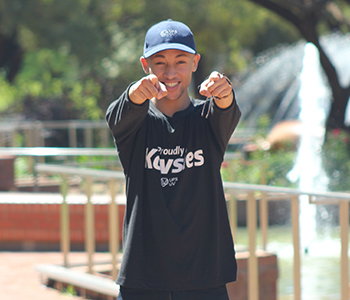Latest News Archive
Please select Category, Year, and then Month to display items
05 June 2018
Photo Supplied
 Archaeological excavations in the Wonderwerk Cave, north of Kuruman in the Northern Cape.
Archaeological excavations in the Wonderwerk Cave, north of Kuruman in the Northern Cape.
Research fellow Dr Lloyd Rossouw from the Department of Plant Sciences at the University of the Free State (UFS) recently published an article in the Nature Ecology and Evolution journal with Dr Michaela Ecker from the University of Toronto as lead author, and Dr James Brink, research fellow at the UFS Centre for Environmental Management. The findings described in “The palaeoecological context of the Oldowan-Acheulean in southern Africa” provides the first extensive paleoenvironmental sequence for the interior of southern Africa by applying a combination of methods for environmental reconstruction at Wonderwerk Cave, which have yielded multiple evidence of early human occupation dating back almost two million years ago.
Where water once was
The Wonderwerk Cave is found north of the Kuruman hills (situated in Northern Cape) a 140m long tube with a low ceiling. The surroundings are harsh. Semi-arid conditions allow for the survival of only hardy bushes, trees, and grasses. But during the Early Pleistocene, stepping out of the Wonderwerk Cave you would have been greeted by a completely different site, the researchers found. Using carbon and oxygen stable isotope analysis on the teeth of herbivores (Dr Ecker), fossil faunal abundance (Dr Brink), as well as the analysis of microscopic plant silica remains (phytoliths) excavated from fossil soils inside the cave (Dr Rossouw), the results show that ancient environments in the central interior of southern Africa were significantly wetter and housed a plant community unlike any other in the modern African savanna.
What difference does it make?
While East African research shows increasing aridity and the spread of summer-rainfall grasslands more than a million years ago, the results from this study indicate an interesting twist. During the same period, shifts in rainfall seasonality allowed for alternating summer and winter-rainfall grass occurrences coupled with prolonged wetlands, that remained major components of Early Pleistocene (more or less the period between one and two million years ago) environments in the central interior of southern Africa. That means our human ancestors were also living and evolving in environments other than the generally accepted open, arid grassland model.
In search of the new Kovsie CyberSta: The Top Five
2017-05-02

Reuben Davids, outgoing #FaceOfFacebook ambassador
for UFS digital channels
Photo: Rulanzen Martin
Do you want to have a say in who becomes the next #KovsieCyberSta? This newly facelifted competition provides the opportunity for not one, but two Kovsie students to live out their dreams in front of the camera. The two winning candidates, as voted by you, our discerning viewers, will be used on all UFS digital channels.
Our top five contestants have been selected, and you can now vote for them on Instagram. The two videos with the most likes on the UFS Instagram page will be declared the winners. Terms and conditions apply.
The top five are (in the order in which their videos were submitted):
- Tammy-Jane Fray: https://www.instagram.com/p/BTgh-A2hwrS
- Ay-muu Mathebula: https://www.instagram.com/p/BTgiV1KBKwJ
- Lindelani Jones Nomnganga: https://www.instagram.com/p/BTkzs51BfeA
- Thulaganyo (Thuli) Molebalwa: https://www.instagram.com/p/BTk0GaNhmJg
- Georgina Phumeza Mhlahlo: https://www.instagram.com/p/BTk0aQghiSe
The fine print
- The finalists’ videos have been reposted on the @ufsuv Instagram account
- Vote for your favourite candidate by liking their post on this account. Only likes on the @ufsuv Instagram timeline will be used to determine the winners
- Each like will count as a vote, and the person with the most votes at the closing time will be declared the winner
- You will need to be a registered Instagram user to vote
- We have a panel of four judges who will also select their favourite two entries. Their votes will be added to the total likes on the closing day
- The deadline for voting is 12 May 2017 at 12:00
- The two winners will be announced on the afternoon of 12 May 2017, and they will feature in their first video during the Bloemfontein Campus Open Day on 13 May 2017